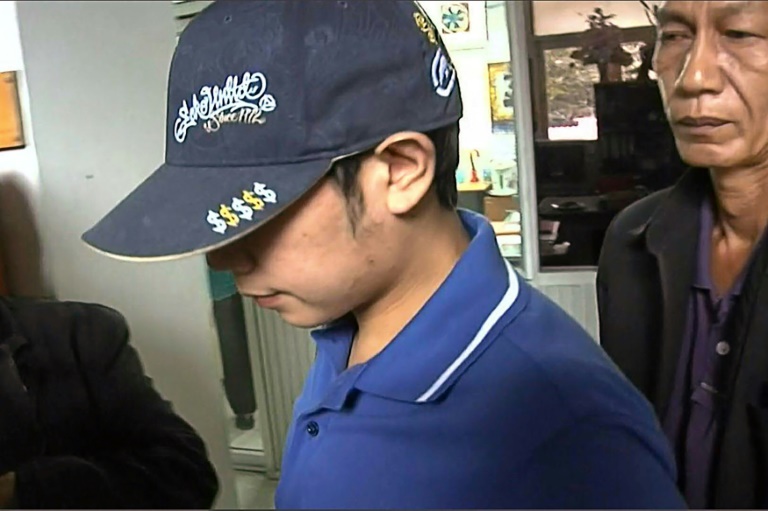Red Bull heir Vorayuth 'Boss' Yoovidhya, seen entering Thong Lor police station in Bangkok in 2012, has become a symbol of what critics say is impunity for Thailand's super-rich
A crashed Ferrari, a dead policeman and a fugitive heir to a multibillion-dollar fortune — 10 years on, Thailand is no closer to resolving one of its most notorious hit-and-run cases.
Vorayuth “Boss” Yoovidhya, princeling of the Red Bull energy drink family, is accused of ploughing his sports car into police officer Wichean Glanprasert’s motorbike in Bangkok’s wealthiest neighbourhood a decade ago on Saturday.
After dodging prosecutors and finally fleeing Thailand on a private jet in 2017, Vorayuth became a symbol of what critics say is the impunity enjoyed by the super-rich in the kingdom.
“The perception of different justice systems for different segments of society cripples people’s trust in the Thai state’s capacity to carry out its responsibility to protect human rights for all Thai people,” Amnesty International Thailand told AFP.
As the grandson of Red Bull co-founder Chaleo Yoovidhya, who died in 2012, Vorayuth is part of a clan with an estimated net worth of $26.4 billion — making it Thailand’s second-richest family, according to Forbes.
“This family is not only powerful in Thailand, but they are very powerful worldwide too,” Thai political analyst Pavin Chachavalpongpun from Kyoto University told AFP.
– Glamorous lifestyle –
Within hours of the crash, investigators followed a trail of brake fluid to the Yoovidhya family’s Bangkok compound, where they found a badly dented vehicle with a smashed windscreen.
Police initially accepted a claim that an employee was driving, but Vorayuth became the main suspect and his family later paid the victim’s relatives $100,000 compensation, according to the BBC and New York Times.
For five years, Vorayuth played a game of cat and mouse ducking court summonses — claiming through lawyers he was overseas on business or ill — while photographs documented a globetrotting lifestyle: living it up in London, attending Red Bull racing events, or going off on beach holidays and ski trips.
Charges of speeding, drunk driving and failing to render assistance expired, before a Bangkok court belatedly issued an arrest warrant in 2017.
By then, Vorayuth had already fled.
In 2020, the Thai authorities dropped all charges against Vorayuth, triggering a huge public outcry — including a social media campaign to #BoycottRedBull.
Amid the backlash, TCP Group — Red Bull Thailand’s parent company — distanced the firm from the case, saying the issue was a private matter.
As anger mounted, and with youth-led anti-government demonstrations growing in the streets, Prime Minister Prayut Chan-O-Cha’s office ordered a review, which concluded the entire investigation had been “compromised”.
Rights campaigners contrasted the foot-dragging in the Vorayuth case with the swift action meted out to anti-government protest leaders, many of whom were hit with multiple royal defamation charges, which carry a prison term of up to 15 years.
Thailand’s Attorney General’s Office announced fresh charges against Vorayuth and, in September 2020, Interpol issued a Red Notice for his arrest.
An updated version from March last year said Vorayuth had made an attempt to access the Red Notice and was likely around France at the time.
The notice also cited Austria — where Red Bull has its headquarters — as a possible location.
– One charge left –
Last month, a charge of using cocaine expired, Thailand’s Attorney General’s office said, leaving only one avenue for prosecutors to pursue against Vorayuth: reckless driving causing death, which carries a maximum 10-year prison term.
The AG’s office told AFP that the charge is valid until 2027. Few, however, expect Vorayuth to face the courts.
“Even from the beginning, a lot of people expected how it would end,” Pavin said, noting intense public anger around the case.
“Rich people getting away with crime has become so normalised in Thai society. Thai people don’t accept that it’s OK.”










